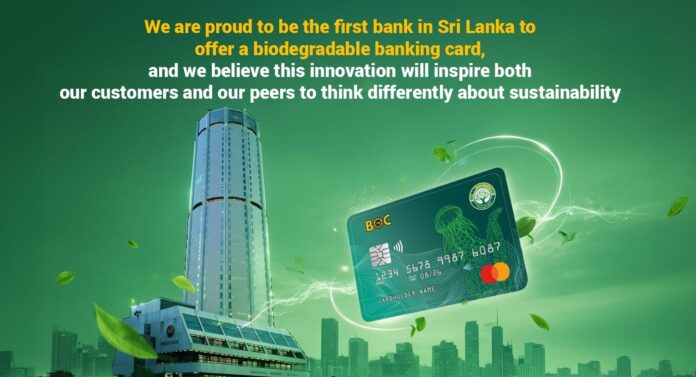By: Staff Writer
September 23, Colombo (LNW): Sri Lanka has taken a decisive step towards greener financial solutions with the launch of its first-ever biodegradable banking card, a collaborative effort between Lake House Technologies, Bank of Ceylon (BOC), Thales, and Mastercard International. The eco-friendly card, unveiled this week, is positioned as a landmark innovation in the nation’s banking and payments industry.
Unlike conventional PVC-based cards, which can take centuries to decompose, the new card is made from non-edible, corn-derived polylactic acid (PLA). The material is fully industrially compostable, offering an environmentally responsible alternative without compromising on durability, security, or international functionality.
Lake House Technologies, a market leader with over a decade of experience in delivering secure and innovative card solutions to Sri Lanka’s banking sector, spearheaded the project. Division Executive Director Tony Johnpillai, who has pioneered multiple firsts in the industry, said the launch reflects the company’s vision of blending technology with sustainability.
“This project reflects our vision to bring world-class, environmentally responsible innovations to Sri Lanka’s banking sector,” Johnpillai said. “Partnering with BOC and global leaders like Thales and Mastercard ensures that we are not only meeting the evolving demands of the market but also contributing to a sustainable future.”
The environmental implications are significant. With millions of banking cards issued annually in Sri Lanka, the introduction of biodegradable cards could substantially reduce plastic waste heading to landfills. Financial analysts note that even a partial shift towards PLA cards will have measurable environmental benefits, especially if other banks adopt similar practices.
BOC plans to roll out the cards in phases, offering them to both new customers and those renewing expired cards. This phased approach ensures a smooth transition and minimizes disruption to cardholders while providing them with the choice to switch to a greener alternative.
The involvement of Thales, a world leader in digital identity and security, and Mastercard International, one of the biggest global payment networks, ensures the new card meets international security and performance standards. This partnership underscores the ability of Sri Lanka’s financial services sector to integrate seamlessly with global innovations.
Industry observers say the launch aligns with growing global momentum for sustainable financial products, as banks and consumers worldwide become increasingly conscious of their environmental footprint. Sri Lanka’s introduction of biodegradable cards places it among the early adopters in Asia.
For Lake House Technologies, the initiative not only cements its reputation as an innovation leader but also highlights the broader role of private sector partnerships in advancing the country’s sustainability agenda. By combining environmental responsibility with cutting-edge technology, the firm is setting a new benchmark for the local industry.
With the launch of this eco-friendly card, Sri Lanka signals its commitment to balancing financial innovation with environmental stewardship. As more banks follow BOC’s lead, the nation could witness a gradual but significant transformation in how financial services are delivered reducing reliance on harmful plastics while empowering customers with secure, sustainable choices
